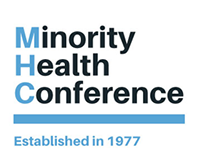FAQs
- What is the Minority Health Conference?
- Who is responsible for conference planning and implementation?
- How was the theme selected?
- Who should attend the conference?
- I’m a member of the media. Can I attend the conference?
- What are the goals of the conference?
- Why has the cost to attend the conference increased?
What is the Minority Health Conference?
The interdisciplinary Minority Health Conference is the largest and longest-running student-led health conference in the nation. The conference raises awareness of health disparities and mobilizes students, academics, and communities to advocate for change. Formed in 1977 and led by the Minority Student Caucus at the University of North Carolina Gillings School of Global Public Health, the Minority Health Conference attracts a variety of attendees that reflect the different lived stories and perspectives in public health, both in-person and via webcast.
Who is responsible for conference planning and implementation?
The Planning Committee, a team of student volunteers from diverse backgrounds who self-identify as minority and non-minority students, make this student-led conference a reality.
How was the theme selected?
This year’s theme, Truth to Power: Exercising Political Voice to Achieve Health Equity—selected by the conference co-chairs—focuses on the tools and approaches we need to uplift marginalized voices, embolden effective leadership, and create policy that is community-driven and grounded in equity.
Who should attend the conference?
Community members, professionals, students, and researchers are welcomed and encouraged to participate in the conference. Through keynote presentations, networking opportunities, engaging breakout sessions, and informative exhibitors and posters, attendees will gain powerful skills on how to effectively advocate for causes they care about.
I’m a member of the media. Can I attend the conference?
If you are a member of the media, pre-registration is required to cover the event due to capacity limits. Please contact minorityhealthconference@unc.edu with “Press Registration Request” in the subject.
What are the goals of the conference?
For the 41st anniversary of the conference, the Planning Committee strives to provide a forum that highlights effective and engaging advocacy efforts in our communities. Responding to feedback from previous conference surveys, a primary goal of the Planning Committee is to make this year’s conference more interdisciplinary. To meet this goal, the conference will feature diverse breakout session topics ranging from food justice to sexual violence to modern immigration policy.
Why has the cost to attend the conference increased?
The conference has grown substantially since 1977 but we remain true to our roots as a student-run conference. This challenging commitment to run the largest and longest student-led health conference in the country, unfortunately, means that we have a limited budget. While we endeavor to keep the conference accessible to students and community members, our fundraising is limited to our small student fundraising committee.
With increased costs for facilities, speakers, and other aspects of the conference, we have set new fees to keep the conference affordable but responsive to increasing financial demands and still maintain the high quality of the conference. We recognize that the conference registration fees are lower than many similar events. We continue to expand our fundraising efforts in hopes to keep conference fees low in upcoming years.
